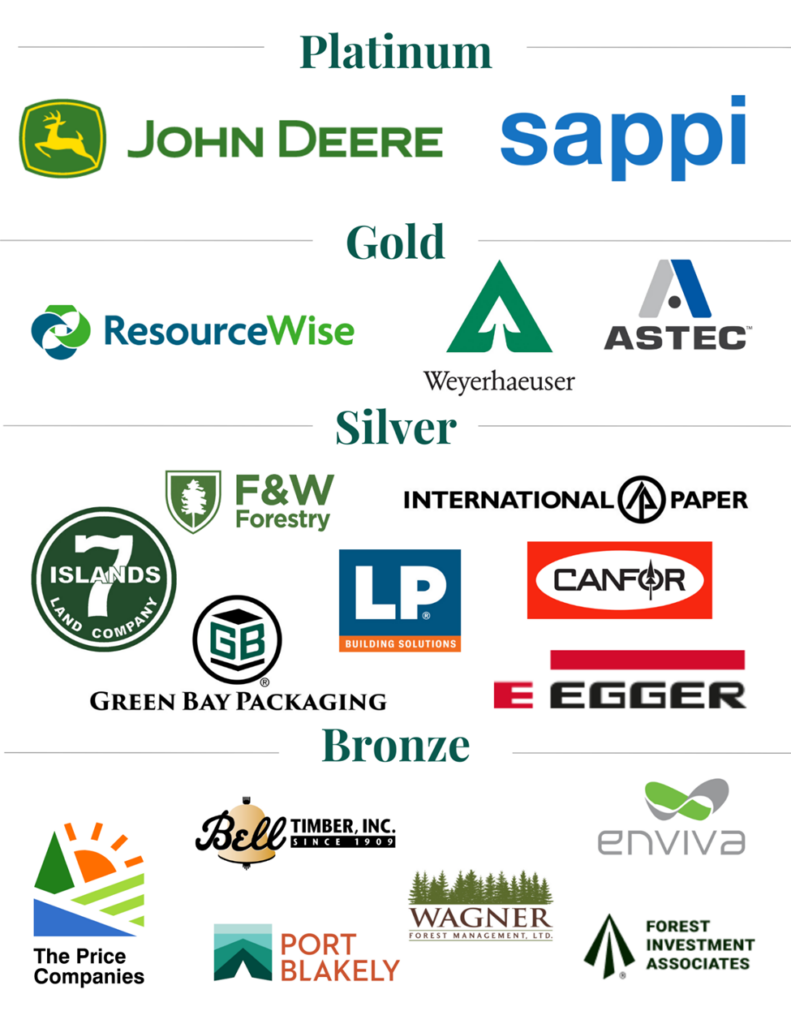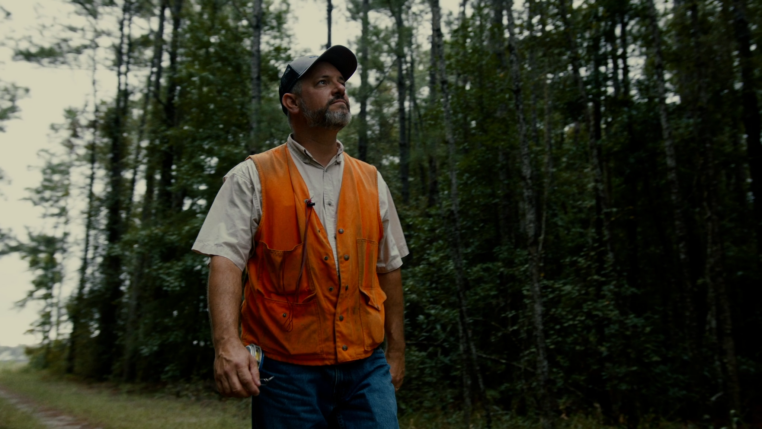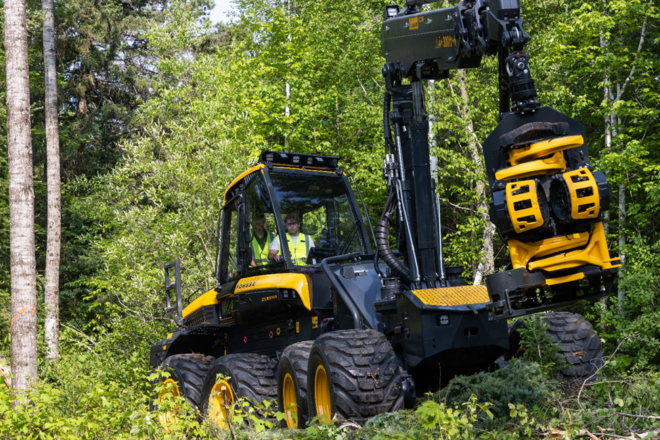FRA 2022 Fall Board Meeting Summary of Business
FRA’s 2022 Fall Board Meeting, September 28-30, drew members and friends from across the country to Portland, Maine, for committee business, educational sessions, and the opportunity to network with peers. For those in attendance, we ask you to take a few minutes to complete a short meeting survey – your feedback is important as we plan future FRA events.
FRA was delighted to welcome Senator Angus King (I-ME), who joined us in Portland and addressed meeting attendees on September 30. Senator King discussed the importance of the forest products industry to Maine and the nation, and the role they play in maintaining healthy forests.

The Senator remarked on a hearing on federal land management that had taken place the previous day in which he testified for active forest management on Forest Service lands to reduce the risk of fire. The Senator observed that the lack of management on federal lands out west has devastated the forest products industry in that part of the country and has resulted in more intense fires. Senator King additionally spoke on the workforce issues facing the industry and how legal immigration could help address labor shortages. On broader issues, Senator King discussed how the National Environmental Policy Act (NEPA) permitting requirements are too stringent and create delays in meeting the infrastructure and energy needs of the country.
Over the course of the meeting, members heard insights from a slate of dynamic speakers:
- Jon Samson, Executive Director, Agricultural and Food Transporters Conference, American Trucking Associations
- Policy Solutions to Address Trucking Issues
- Matt Russell, Forest Analytics Consultant, Arbor Custom Analytics LLC.
- A Review of the Log Trucking Workforce and Comparisons to Other Industries
- Brian Gibson, Executive Director of the Center for Supply Chain Innovation at Auburn University
- Managing a Constrained Supply Chain
- Rodney Nye, Senior Vice President of Business Development, Dedicated Contract Services, J.B. Hunt
- J.B. Hunt’s Role in the Transportation Sector: Past, Present, and Future
- Daniel LaMontagne, President & CEO, Seven Islands Land Company
- Challenges and Opportunities for Forestland Management in Maine
- Fred Horton, President and CEO, Standard Biocarbon
- Developing a New Forest Industry – Perspectives from Standard Biocarbon
- Patrick Strauch, Executive Director, Maine Forest Products Council
- How Other Regions Can Learn from Maine’s Experience to Support a Robust Supply Chain
- Brian Kernohan, Chief Sustainability Officer, Manulife Investment Management, Private Markets
- Emphasizing ESG Strategies and How to Link to Business Plans
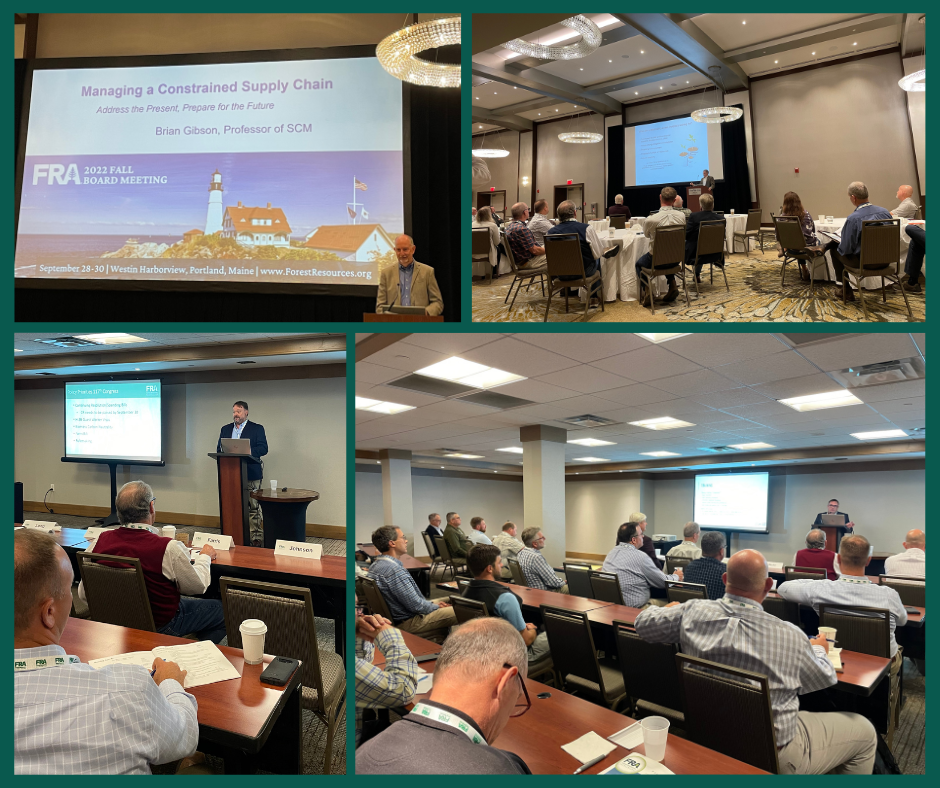
Please CLICK HERE to view the presentations we have permission to share on the FRA website. You will need to sign in as an FRA member to access. Please contact FRA’s Communications and Marketing Manager, Vanessa Connelly, [email protected], if you need assistance.
At the September 30 Board of Directors Meeting, attendees additionally heard from Doug Long, Senior Vice President, Forest Products, Rayonier, and FRA Officer, who provided a report on a strategy for actionable recommended practices to keep logging operators safe for harvesting and operation safety. Doug facilitated the conversation with a More Than Trees PowerPoint on the value of identifying lifesaving rules using an example from the Oil and Gas Industry that has resulted in a significant decline in fatality rates. He discussed ways in which FRA and the National Timber Harvesting and Transportation Safety (THATS) Foundation can invest in the promotion of logger and truck driving safety and professionalism and develop a similar set of rules, with the goal of establishing a learning environment where employees feel empowered as there are standardized rules that in place that everyone agrees to follow.
Next Steps:
- FRA will connect with Michael Schmidt (USDA Forest Service) on research being carried out on logging safety, reach out to logger training programs and identify safety lessons being taught, and connect with SIC/SFI training objectives.
- Gain insight from logging safety practices recommended by John Deere.
- Coordinate with the THATS Foundation
During the three-day meeting, FRA’s National Committees and the THATS Foundation met, developing recommendations based on these presentations and other reports.
National Public Policy/Advocacy Committee
The National Public Policy and Advocacy Committee convened with presentations from Jon Samson, American Trucking Associations (ATA), and Matt Russell, Arbor Custom Analytics LLC. Jon began by reviewing the challenges of the transportation industry, including the driver shortage, which is currently at 80,000 and is expected to worsen over the next five years. Jon explained how this shortage was exacerbated during the covid pandemic, with many drivers retiring and the vaccine mandate causing some younger drivers to leave the industry (more than 60 percent of drivers opposed the vaccine mandate.) ATA was successful in a lawsuit that challenged the vaccine mandates of drivers. Jon reviewed efforts to address this driver shortage and discussed the infrastructure bill, which included a pilot program to train young drivers 18-20 years old. Once drivers complete the apprenticeship program, they will be able to drive a commercial vehicle interstate. This program could certify up to 25,000 18–20-year-old drivers as long-haul truckers annually until it ends in 2024.
Jon also addressed the Entry-Level Driver Training requirements for drivers seeking a commercial driver’s license (CDL). The new training requires drivers to take classroom and behind-the-wheel driving prior to receiving a CDL. ATA supports these training requirements as it will ultimately improve the safety of young drivers.
Other issues Jon reviewed include increased salaries to retain drivers, California Assembly Bill 5, the upcoming independent contractor rule, supply chain concerns of the transportation industry, and the need to address the Bridge Formula Program to allow trucks with heavier gross vehicle weights on the interstates.
Matt Russell followed with a presentation on wages in the log hauling industry and how they compare with trucks that transport other materials. A review of the Bureau of Labor Statistics data shows that there are 1.9 million truck drivers in the U.S. Trucks that haul logs make up a small subset of this number. Wage data shows that log truck drivers’ salaries are competitive with other sectors that haul products other than wood. Matt additionally reviewed research that addressed the barriers to recruiting log truck drivers. These barriers include experience and driving record, wages, drug testing, and work ethic. Matt also discussed the cost of keeping log haulers on the road and noted that the highest cost is retention.
Matt then presented on the Pandemic Assistance for Timber Harvesters and Haulers (PATHH) program, which provided financial relief to loggers whose businesses were impacted by the pandemic. Regions of the country that received the most funding were the Southeast, Northeast, and Lake States.
FRA’s Vice President of Government Affairs Tim O’Hara closed the session with a presentation on the upcoming midterm elections. In the coming weeks, the committee will begin to outline its priorities for the 118th Congress based on issues ranked in order of importance by FRA’s Executive Committee as follows:
- Transportation
- Forest-based carbon neutrality
- The Endangered Species Act—specifically the proposed rule to list the northern long-eared bat as endangered.
National Operations Committee
Kicking off the Operations Committee meeting, Rodney Nye, Senior Vice President of Business Development, Dedicated Contract Services, JB Hunt, provided a history of JB Hunt and the company’s emergence as an industry leader in the transportation industry. Rodney discussed how JB Hunt is optimistic about growth opportunities to expand the timber transportation side of the business and improve overall efficiency industry-wide. Rodney also talked about the corporate focus on driver safety and workforce recruiting.
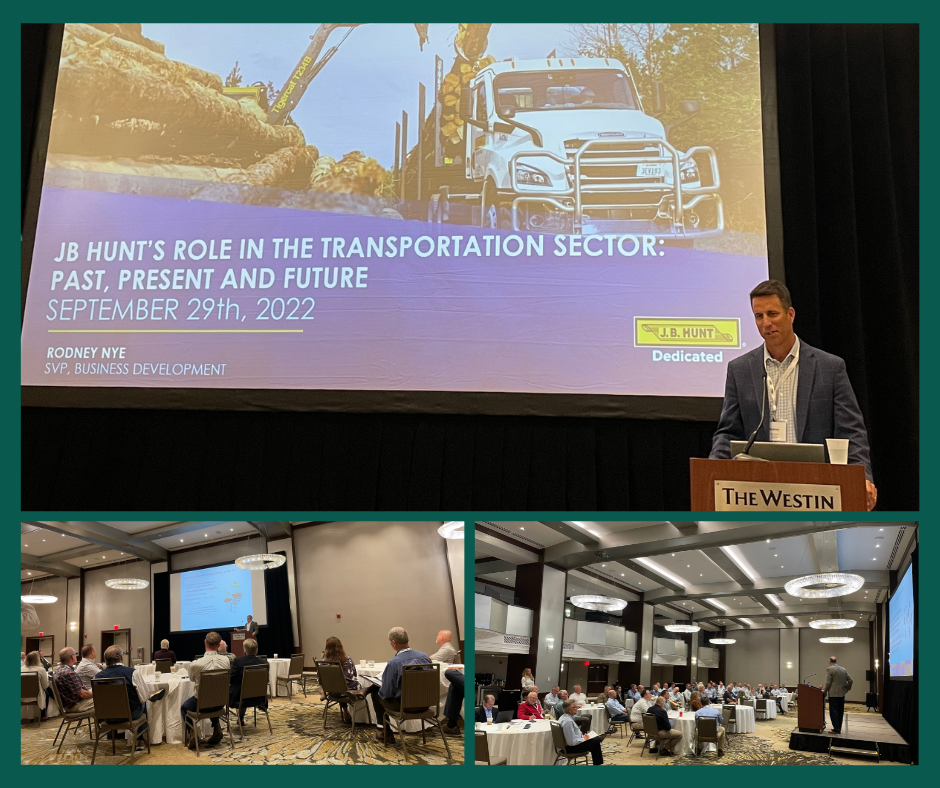
Rodney’s presentation was followed by a committee roundtable discussion on “Operation Challenges and Solutions for Success.” The discussion centered predominantly around two main topics: industry-wide safety, and operational efficiencies, the goal being to develop action items to address these critical issues. Key takeaways from the discussions are as follows:
Timber Harvesting Safety:
- Develop a Simple Safety Focus Tool on best safety practices (similar to the Oil and Gas industry’s model referenced earlier).
- Explore a “Gold Star” safety label or brand for FRA members.
- Increased collaboration with “Pro Logger” training programs.
Forest Products Security:
- Redistribute and promote the FRA blog series and cybersecurity webinars from earlier this year, both of which are archived on FRA’s website.
- Consider collaboration with Logger Training Programs since the entire supply chain would be impacted by a security breach.
- Share collective IT expertise among our members.
Equipment & Technology Advancement:
- Simulators are a great tool for training new operators.
- The downstream benefits from drones, Lidar, and other technological advancements are huge for the entire supply chain.
- FRA’s focus should be on sharing best practices with membership.
Supply Chain Constraints:
- Consider strategic alliances with Ag Advocacy groups with a strong presence in Washington, DC.
- Visibility is critical. We must increase our industry’s exposure to the target audience (geofencing).
- Important to limit disruptions to the best of our abilities (i.e., truck turnaround time) and emphasize the quality-of-life benefits that our industry can offer.
National Supplier/Consumer Relations Committee
The committee heard a presentation on the Maine Forest Opportunity Roadmap (FOR/Maine) effort, which has worked on supporting existing and attracting new businesses to Maine. This led to a committee discussion that focused on how other regions can learn from the collaboration and how increased engagement with state leaders in government and economic development has benefited Maine’s forest sector since this effort began.
The committee additionally discussed the ongoing inventory of post-secondary programs for loggers, truckers, and mill workers, which will provide an opportunity for FRA members to recruit workers from these programs, send potential employees to these programs, and connect the schools so that they can learn from each other. The committee has identified and connected with over a dozen programs across the country and is working on gathering information from them. The committee has decided to publish what we know up to this point on the FRA website and through a Woods to Mill blog in the hope that sharing this information publicly will help identify even more programs.
National Timber Harvesting and Transportation Safety Foundation
The National Timber Harvesting and Transportation Safety (THATS) Foundation met to review its financial status. A grant application for $10,000 was received from the Pennsylvania SFI Implementation Committee which would allow the committee to expand access for training to loggers by converting to an online format. Currently, loggers must attend training session in person. The grant request was approved. Foundation members also discussed the increased focus on logger safety and provided thoughts on how to improve safety conditions, including scheduling quarterly Zoom calls to provide a forum for members to share what’s working and not working.
Board of Directors Meeting
At the September 30 Board of Directors Meeting, and following Senator King’s remarks, attendees:
- Reviewed FRA’s financial and operational performance fiscal year to date.
- Approved the FY 21-22 Audit Report.
- Reviewed reports from FRA’s National Committees and the THATS Foundation.
- Heard the Meetings Advisory Group report on upcoming meetings: FRA’s 2023 Annual Meeting will be held at The Grand Hotel Golf Resort and Spa, Point Clear, AL, May 8-10, and the 2023 Fall Meeting will be held in conjunction with a Legislative Fly-In, October 3-5 at the Phoenix Park Hotel, Washington, DC. Please mark your calendar and plan to attend.

Continuing Education Credits
The FRA 2022 Fall Board Meeting was approved for 9.5 Category 1 SAF CFE credits and sign-in sheets have been submitted to the SAF national office. Please reach out if you have questions regarding credit for your meeting attendance.
Meeting Sponsors
Thank you to the FRA 2022 Fall Board Meeting sponsors – this meeting would not have been possible without you, and we are incredibly thankful for your support.
